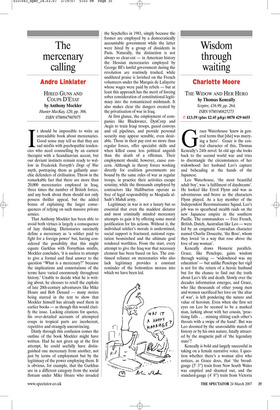The mercenary calling
Andro Linklater
HIRED GUNS AND COUPS D’ETAT by Anthony Mockler Hunter MacKay, £20, pp. 366, ISBN 9780947907075 It should be impossible to write an unreadable book about mercenaries. Good sense may tell us that they are sad misfits with psychopathic tendencies who need counselling by an earnest therapist with a Scandinavian accent, but our deviant instincts remain ready to wallow in Frederick Forsyth’s Dogs of War myth, portraying them as gallantly anarchic defenders of civilisation. Throw in the remarkable fact that there are more than 20,000 mercenaries employed in Iraq, three times the number of British forces, and any book about them should not only possess thriller appeal, but the added bonus of explaining the larger consequences of relying on such massive private armies.
That Anthony Mockler has been able to avoid both virtues is largely a consequence of lazy thinking. Dictionaries succinctly define a mercenary as ‘a soldier paid to fight for a foreign power’ but, having considered the possibility that this might equate Gurkhas with Forsythian misfits, Mockler concludes, ‘it is useless to attempt to give a formal and final answer to the question “What is a mercenary?” because the implications and connotations of the terms have varied enormously throughout history.’ Unable to decide what he is writing about, he chooses to retell the exploits of late 20th-century adventurers like Mike Hoare and Bob Denard — many stories being starred in the text to show that Mockler himself has already used them in earlier books — as though this would clarify the issue. Lacking citations for quotes, his over-detailed accounts of attempted coups in tropical parts are incoherent, repetitive and strangely unconvincing.
Dimly through this confusion comes the outline of the book Mockler might have written. Had he not given up at the first attempt, he could usefully have distinguished one mercenary from another, not just by terms of employment but by the legitimacy of the power employing them. It is obvious, for example, that the Gurkhas are in a different category from the social flotsam under Mike Hoare who invaded the Seychelles in 1981, simply because the former are employed by a democratically accountable government while the latter were hired by a group of dissidents in Paris. Naturally, the distinction is not always so clear-cut — in American history the Hessian mercenaries employed by George III’s lawful government during the revolution are routinely trashed, while undiluted praise is lavished on the French volunteers under the Marquis de Lafayette whose wages were paid by rebels — but at least this approach has the merit of forcing sober consideration of constitutional legitimacy into the romanticised mishmash. It also makes clear the dangers created by the privatisation of war in Iraq.
At first glance, the employment of companies like Blackwater, DynCorp and Aegis to train Iraqi troops, guard convoys and oil pipelines, and provide personal security may appear sensible, even desirable. Those in their pay cost no more than regular forces, offer specialist skills and when killed cause less political anguish than the death of a rifleman. Their employment should, however, cause concern. Although in theory forces working directly for coalition governments are bound by the same rules of war as regular troops, in practice their activities escape scrutiny, while the thousands employed by contractors like Halliburton operate as free of legal responsibility as Moqtada alSadr’s Mahdi army.
Legitimacy in war is not a luxury but so essential that even the maddest dictator and most criminally minded mercenary attempts to gain it by offering some moral justification for his actions. Without it, the individual soldier’s morale is undermined, social support is fractured, national reputation besmirched and the ultimate goal rendered worthless. From the start, every attempt to give the Iraq war that necessary element has been based on lies. The continued reliance on mercenaries who also lack legitimacy provides a constant reminder of the bottomless morass into which we have been led.


















































































 Previous page
Previous page